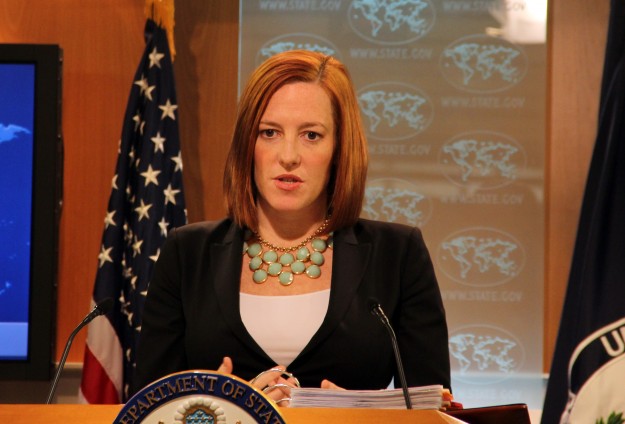 US State Department spokeswoman Jen Psaki[/caption]
US State Department spokeswoman Jen Psaki[/caption]WASHINGTON, February 14. /TASS/. The United States has played absolutely no role in the emergence of the Islamic State (IS) militant group in Syria and Iraq, US State Department spokeswoman Jen Psaki has told reporters.
Speaking at a briefing on Friday, Psaki said Washington believes that Damascus and the former authorities in Baghdad are mainly to blame for this process.
Russian Foreign Minister Sergey Lavrov told last week�s Munich conference that at the early stage of the Syrian conflict many Western politicians said that the threat of extremism and terrorism should not be exaggerated as it would go away somehow and the key goal was to topple the regime in Damascus.
"We see what has come out of this," Lavrov said, adding that no "adequate strategy" on containing these challenges has been developed so far.
At Friday�s briefing, Psaki reiterated the US position that Syrian President Bashar Assad has "lost all legitimacy and must go." According to Psaki, Assad "is the biggest magnet for terrorism in the region" that he allowed the IS to "grow and prosper in his own country."
"And that has led to the strength that they [extremists] have built over the past couple of years," she said, adding that the former Iraqi government�s "lack of inclusivity" and the unpreparedness of the past security forces contributed to their growth.
Speaking on whether any Syrian opposition forces that the US supports have joined the IS, Psaki said that these groups need to be specified. She also said some US regional allies could have done more to crack down on financing of foreign fighters.
US mass media and independent experts, including Leslie Gelb, president emeritus of the Council on Foreign Relations, say that Washington has been recently forced to cooperate with Assad�s government in counteracting Islamists.
Most experts believe that this is a sound approach as prioritizing the regime change in Damascus now means giving way to fanatics who try to create a medieval caliphate in the modern Middle East.
For a successful fight against the IS, Gelb says, Washington should rely on Russia and Iran and appease the US traditional allies like Turkey and Saudi Arabia who have been the main suppliers of weapons and funds to these Islamist terrorists.
By Itar Tass










